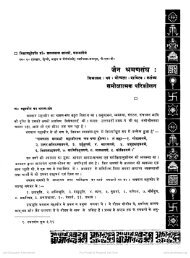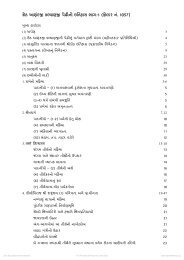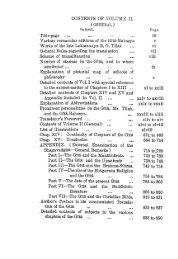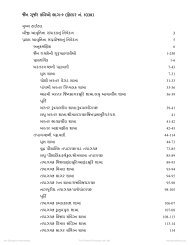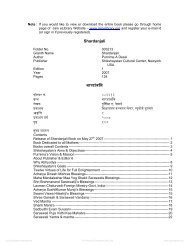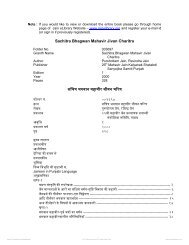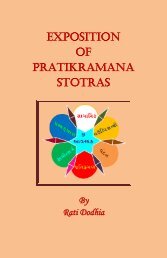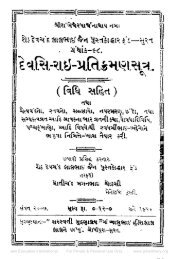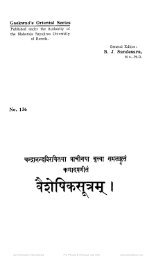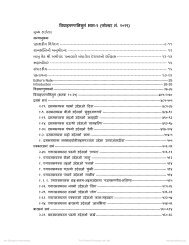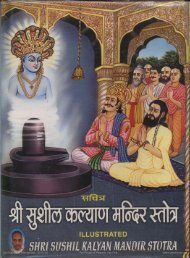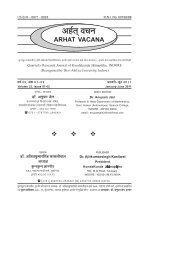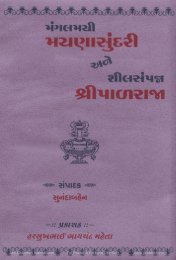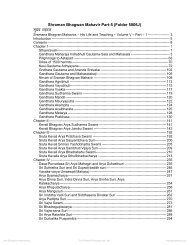Chapter - 08 Bon Po Religion - Jain Library
Chapter - 08 Bon Po Religion - Jain Library
Chapter - 08 Bon Po Religion - Jain Library
You also want an ePaper? Increase the reach of your titles
YUMPU automatically turns print PDFs into web optimized ePapers that Google loves.
Shri Ashtapad Maha Tirth - II<br />
4. The <strong>Bon</strong> of the Scriptures and the Secret Oral Instructions of the Masters (dpon-gsas<br />
manngag lung gi bon): This collection consists of the oral instructions (man-ngag)<br />
and the written scriptures (lung) of the various masters (dpon-gsas) belonging to the<br />
lineages of transmission for Dzogchen.<br />
5. The <strong>Bon</strong> of the Treasury which is of the highest purity and is all-inclusive (gtsang<br />
mtho-thog spyi-rgyug mdzod kyi bon): This collection contains essential material from<br />
all Four <strong>Po</strong>rtals of <strong>Bon</strong>. The Treasury which is the fifth (mdzod lnga) is decribed in<br />
the gZer-myig, "As for the highest purity (gtsang mtho-thog), it extends everywhere.<br />
As insight, it belongs to the <strong>Bon</strong> that is universal (spyi-gcod). It purifies the stream of<br />
consciousness in terms of all four <strong>Po</strong>rtals." [30]<br />
The Three Cycles of Precepts that are Outer, Inner, and Secret (bka' phyi nang gsang skor<br />
gsum) are as follows:<br />
1. The Outer Cycle (phyi skor) contains the Sutra system of teachings (mdo-Iugs) relating<br />
to the Path of Renunciation (spong lam).<br />
2. The Inner Cycle (nang skor) contains the Tantra system of teachings (rgyud-Iugs) relating<br />
to the Path of Transformation (sgyur lam), otherwise known as the Secret Mantras (gsang<br />
sngags).<br />
3. The Secret Cycle (gsang skor) contains the Upadesha teachings (man-ngag) relating to<br />
the Path of Self-Liberation (grollam), otherwise known as Dzogchen, the Great Perfection.<br />
4. New <strong>Bon</strong> (bon gsar-ma) arose since the fourteenth century, relying upon the discoveries<br />
of a different Terma system than the above. As a whole, this system is quite similar to<br />
the Nyingmapa one and here Padmasambhava is also regarded as an important figure.<br />
Indeed, some Tertons, such as Dorje Lingpa, discovered both Nyingmapa and <strong>Bon</strong><br />
<strong>Po</strong> Termas. In a text such as the <strong>Bon</strong>-khrid, rediscovered by Tsewang Gyalpo, it is<br />
asserted that Padmasambhava went to Uddiyana and received the Dzogchen teachings<br />
directly from the Sambhogakaya Shenlha Odkar (gShen-lha 'od-dkar) himself. Later he<br />
transmitted these teachings in Tibet, concealing many of them as Terms meant for the<br />
use of the future generations of <strong>Bon</strong> <strong>Po</strong>'s. According to Shardza Rinpoche also, the New<br />
<strong>Bon</strong> Movement began in the fourteenth century and continues until today. The Termas<br />
revealed to such masters as Lodan Nyingpo, Mizhik Dorje (otherwise known as Dorje<br />
Lingpa), Kundrol Dragpa, Dechen Lingpa, Sang-ngag Lingpa, Khandro Dechen Wangmo,<br />
and so on, are all considered Tersar (gter-gsar) or recent treasure text discoveries. The<br />
New <strong>Bon</strong> has flourished mainly in Eastern Tibet. [31]<br />
The Origin of Dzogchen<br />
Just as in the case of the Nyingmapas among the Tibetan Buddhists, the <strong>Bon</strong> <strong>Po</strong> tradition possesses<br />
as its highest teaching the system of contemplation known as Dzogchen, "the Great Perfection,"<br />
(rdogs-pa chen-po). These teachings reveal in one's immediate experience the Primordial State<br />
(ye gzhi) of the individual, that is to say, the individual's inherent Buddha-nature or Bodhichitta,<br />
which is beyond all time and conditioning and conceptual limitations. This Natural State (gnas-<br />
Iugs) is spoken of in terms of its intrinsic primordial purity (ka-dag) and its spontaneous<br />
The <strong>Bon</strong> <strong>Po</strong> Traditions of Dzogchen<br />
394



